The complexity of construction projects makes the job of construction managers equally demanding.
The number of things a construction manager has to deal with and coordinate is staggering. You need to be a leader, facilitator, communicator, and problem-solver all at the same time.
And, because projects have deadlines, you must use time as effectively as possible.
To help you do all that, we’ve compiled five of the best time management practices used by successful construction managers.
In this article...
Prepare Your Project Plan in Advance
Planning is the foundation that productive construction managers use to make the most of the project time available.
Defining project goals and tasks in advance helps you prepare a robust plan that will ensure that the project is finalized on budget and on time.
The construction industry is known for time and cost overruns, and its productivity has been growing in baby steps of 1% per year over the last 20 years.
If you want to save time, prevent construction delays and raise productivity, planning is crucial. Here is a graph that illustrates the relationship between planning and project success.
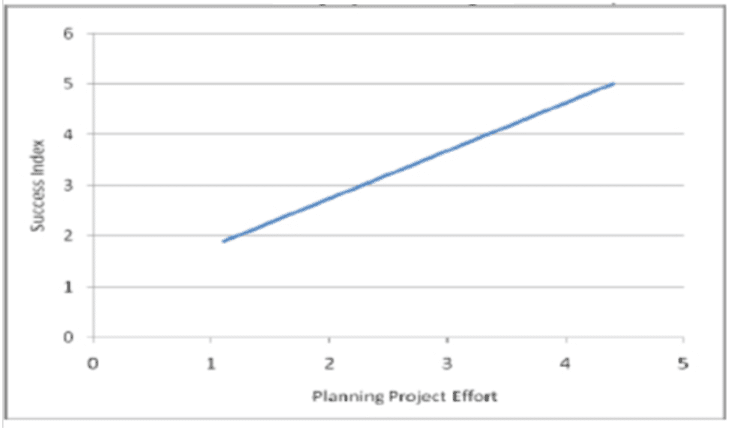
You can see that the intensity of planning efforts has a direct impact on the success index of the projects. In other words, the more effort you invest in planning, the better the project’s chances for success are.
What’s more, planning optimizes the allocation of resources and minimizes costs because change orders when construction is underway are considerably more expensive than changes in the design stage.
The most important thing in project planning is to determine goals and objectives so that you and everyone else are clear on the project outcome and what everybody needs to do to get there.
Research has shown that 37% of projects fail due to a lack of clear goals. In fact, it is the most common indicator of project failure.
The process of determining goals starts with identifying all project stakeholders. In other words, everyone affected by the project should be consulted.
This will help you pinpoint potential issues, particularly regarding scheduling.
It will also give the stakeholders a clear picture of the overall project goal, thus avoiding possible conflicts, duplicate work, or confusion.
Creating a list of project objectives in collaboration with project participants will also help you establish project milestones and track progress.
Once that’s done, you and your team can organize the list and prioritize the project goals.
To sum up, preparing your project plan in advance will increase the likelihood that the project will be finalized within the estimated budget and the specified time, thus building your reputation as a successful construction manager.
Prioritize Your Tasks
The ability to prioritize tasks is one of the most critical skills of effective construction managers.
By prioritizing project tasks, you can efficiently avoid the consequences of unexpected events, delays, and mistakes that no construction project is immune to, thus saving your company both time and money.
If project goals are clearly defined, you will be better able to establish the construction schedule.
That schedule will contain at least a list of tasks, the timeline for their completion, the persons responsible for executing each task, and their level of priority.
The most used method to visually present all these elements is a Gantt chart.
You can use many digital tools to set up the schedule, such as this free construction schedule template with the Gantt view.
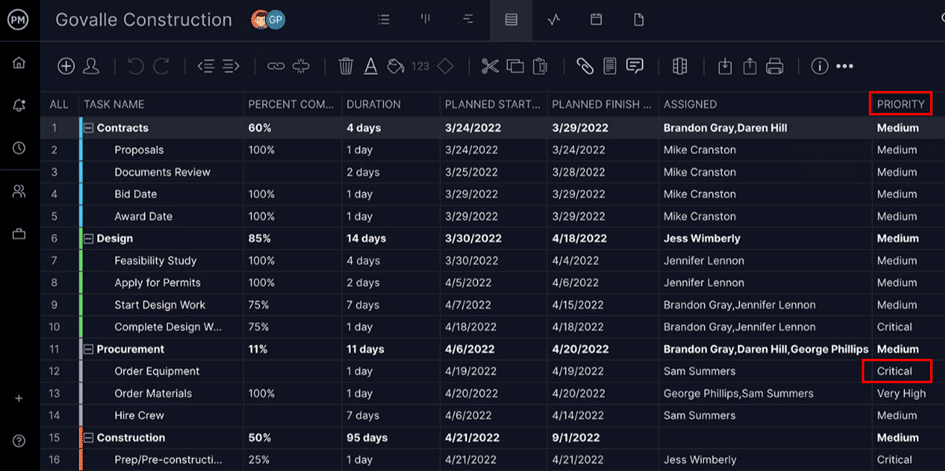
Tasks are listed on the left, followed by their duration, assigned person, level of completion, and priority, which we highlighted.
For example, ordering equipment needed to do the job is a task of critical priority. In this template, you can also add milestones, dependencies, and subtasks as you deem fit.
However, even the best-laid plans (schedules) often have to be changed due to unforeseen events—delays, misunderstandings and mistakes are common in most construction projects.
Of course, this wreaks havoc on your carefully prioritized tasks and their timeline.
When that happens, you’ll need a quick and simple way to reprioritize. One of the simplest ways to do that is the Eisenhower priority matrix:
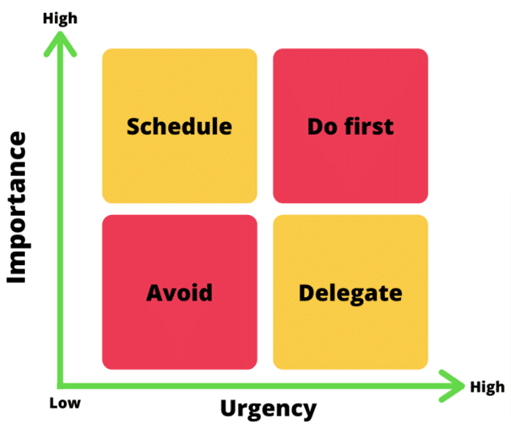
This matrix evaluates tasks according to two criteria—importance and urgency.
Simply put, the “Do first” quadrant is used for the most pressing tasks, i.e., those with critical priority where time is of the essence.
Next, the “Schedule” quadrant is where you place very important but less urgent tasks that should be scheduled, because they require care, but aren’t that time-sensitive.
Then, the “Avoid” quadrant represents tasks of low importance and urgency that don’t require your attention right away and aren’t as critical, so there is no rush in completing them.
Although every project task may seem important, a few can always be put on the backburner.
Finally, the “Delegate” quadrant covers tasks that are not so important but do require prompt action. These should not be ignored but delegated, which is the topic of our next section.
All in all, using a Gantt or other project schedule template and a prioritization matrix to (re)prioritize project tasks will help you navigate the changes and challenges your project is facing, thus making you a better construction manager.
Delegate Those Tasks
Successful construction managers are good delegators. The skill of delegation gives them time for more pressing tasks and boosts their employees’ confidence.
If used competently, it can be a powerful time management tool for you and an excellent professional development tool for your workers.
Delegating your tasks to someone else can be demanding on many levels.
Some managers might find it hard to delegate their tasks because they’re worried about whether another person will do a good job.
Others may be worried about that person doing a better job than them.
However, in these times, delegation is crucial for the development of workers. Just consider the findings of the 2020 survey conducted by the Associated General Contractors of America:
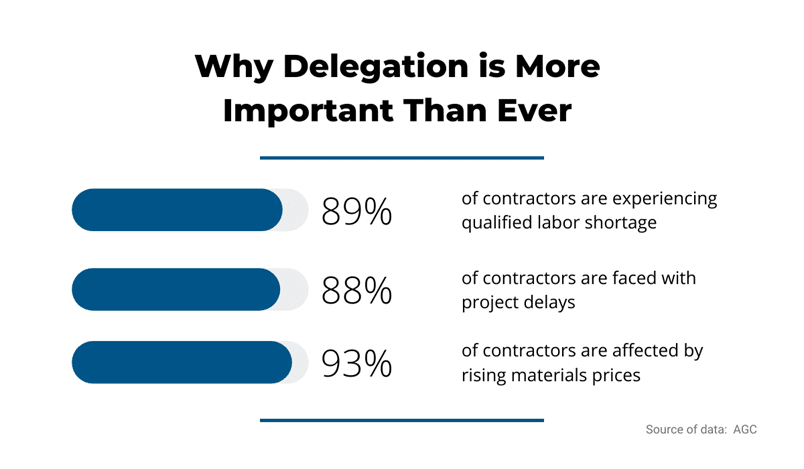
The fact that almost 90% of construction companies are faced with a lack of qualified labor makes the art of delegation essential for training and developing skilled workers and leaders.
Additionally, while the other two pieces of data shown above may not seem so directly related to delegation, in fact being able to delegate effectively will improve your time management and help you control your budget.
Moreover, effective delegation provides many other benefits, such as giving you more time for other critical project tasks.
Still, remember that you should devote some of that time to preparing the worker to handle their workload. Naturally, that time should reflect their knowledge and skill level.
The more you delegate, the more you will learn to trust your workers, because you’ll know they’ve been properly prepared for different kinds of challenges.
On their part, workers will sharpen their skills and become more confident.
So, what does it take to be a good delegator?
Here’s a quick look at the steps recommended in our article on delegation in construction, where you can learn more about what it means to empower your workers.
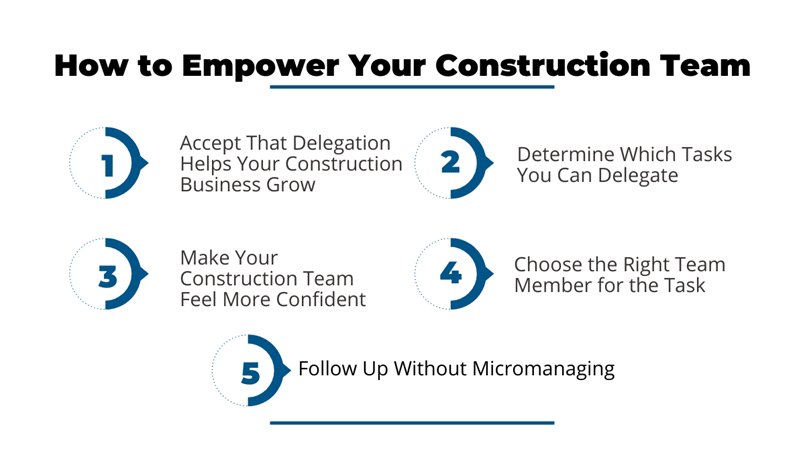
For instance, when choosing a worker you can entrust with a task, first consider the complexity of the task and your employees’ competency level.
This will enable you to produce a shortlist of potential contenders.
For example, proven and experienced workers will usually be your best bet for complex, critical or urgent jobs you can’t do yourself, while the less experienced ones will likely benefit from doing something less challenging that can nevertheless help them showcase their talents.
In conclusion, it’s clear that delegation is one of the most critical yet underused assets for efficient time management while also bringing various professional development opportunities.
Delegation makes your team members better at their job and allows you to excel at yours.
Practice Good Communication
If something separates excellent construction managers from the rest, it’s the way they communicate.
And practicing good communication is essential for the success of any construction project. It’s also a crucial time management tool.
Completing a project on-time and on-budget attests to your communication skills.
In fact, poor communication is one of the main predictors of project failure. The Project Management Institute (PMI) study showed it was a contributing factor in 56% of failed projects.
One of the reasons for this is that effective communication requires a broad set of soft and hard skills.
Good people skills and active listening would be examples of soft skills, while proficient use of online communication tools and file-sharing apps would count as hard skills when it comes to effective communication.
Combined with other construction management skills, these ultimately save you and your team members’ time.
Successful construction managers understand the importance of underlying factors in the communication process. Here’s a visual breakdown of the process:
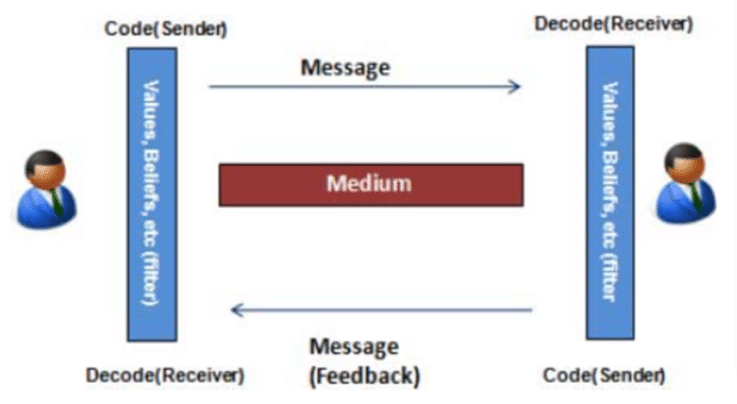
It seems straightforward. There’s a sender who relays the message to a receiver through a medium (face-to-face, e-mail, phone, online communication tools like Google Meet or Slack).
However, the message must go through two filters—the sender’s and the receiver’s. Thus, the most important part of communication is interpreting the message.
And that is influenced by the values, beliefs, emotional reactions, etc., of both parties.
Aware of this, a good manager will be able to clearly communicate, organize and delegate daily, weekly, or monthly tasks to their team.
All of this will result in more efficient performance, thus saving time.
There are many solutions that can streamline construction team communication, such as Monday Construction.

Such mobile applications and software solutions can be effective means of communication if all project stakeholders are committed to using them.
Experience has shown that construction projects work best when there’s a clear communication chain of command agreed between all stakeholders.
This is typically defined in contracts or other project documents. It’s also best to determine which types of communication will be used for specific issues.
Whichever way you look at it, good communication touches so many areas of project management and saves time in all of them.
Thus, your success as a construction manager often depends on being a great communicator.
Use Software Tools to Save Time
As we mentioned, software tools can be used to save both time and money.
Smoothly navigating through different software, apps and tools or choosing the right one for construction project management can mean the difference between success and failure.
It could be said that all software saves time and money.
And in recent years, new technology trends are continually changing the construction industry.
Aside from the Internet-of-Things (IoT), Artificial Intelligence (AI), and Building Information Modeling (BIM), each with their time-saving effects, Software-as-a-Service (SaaS) and mobile apps enabled even the smallest contractors to take advantage of these powerful tools.
There’s plenty to choose from, and almost any type of management software will ensure time savings in one form or another.
For example, larger companies may decide to utilize a complete enterprise resource planning (ERP) solution that provides a real-time view of all company operations.

Such a mobile-enabled, cloud-based construction and accounting software solution includes project management, financial management, job cost accounting, payroll, order management, inventory management, customer relationship management (CRM), etc.
Big or small, comprehensive or specific, software tools can help you plan, control, and coordinate the project from start to finish.
They can prevent costly construction delays and ensure good communication between all stakeholders.
Apps like the one below help the team in the field achieve their maximum potential.
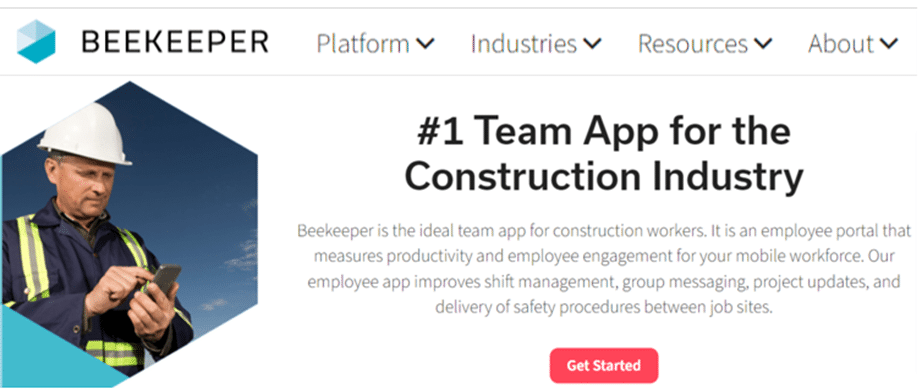
Finally, the way you handle inventory, materials, assets, and equipment will also affect your productivity.
That’s why using the right equipment management software can also be a great time-saver.
For example, using a solution like GoCodes Asset Tracking to track your equipment and tools that often change hands optimizes the usage of resources.

To sum up, time-saving digital resources are readily available.
However, prudent construction managers will evaluate their options and utilize only those software tools that make a difference.
Once everything is running as smoothly as possible, that’s the biggest time-saver in construction and your way to success.
Conclusion
A construction manager has to be able to coordinate different aspects of the project so that every task is completed on time and without many setbacks.
To do this, he or she has to master a variety of skills and best practices.
We hope these time management practices and insights gained from this article will help you become a better problem-solver, planner, delegator, communicator, facilitator, and leader—in a word, a successful construction manager.









